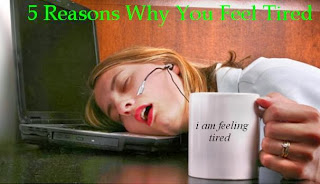Loss of energy may simply be your body's way of telling you it needs to rest. Feeling tired all of the time is a sign that something is going wrong within your body. Here are five causes of fatigue.
Diseases
When you have an infection or illness, your body needs more rest than usual. We often take over-the-counter drugs to help reduce the other symptoms of infections like the common cold, but those drugs do not reduce the need for extra rest. A chronic gastrointestinal problem called celiac disease is accompanied by fatigue.
Disorders
A number of medical disorders can cause fatigue and loss of energy. Myalgic Encephalomyelitis (ME) is a disorder commonly referred to as Chronic Fatigue Syndrome (CFS), although those who suffer from the condition prefer the more accurate term of ME, rather than CFS, because fatigue is not the only symptom. They also suffer from memory loss and other disabling symptoms.
Fibromyalgia is a painful condition and feeling tired is often a symptom, but exercising has been shown to reduce the pain and the fatigue. Insomnia, sleep apnea and other sleep disorders will cause daytime fatigue, because the body is simply not getting enough rest. Depression and bipolar disorder may cause fatigue, as can arthritis and many other health problems.
Being Overweight or Obese
People who are overweight or obese will complain of feeling tired, because they are carrying around all of that extra weight. Think about how much harder it is to walk up a flight of stairs carrying a 20 pound backpack. People who are 20 pounds overweight are constantly carrying around that backpack.
Nutritional Deficiencies or Inadequacies
Nutritional deficiencies or inadequacies are the most common causes of loss of energy or general fatigue. Your body needs a variety of nutrients every day in order to function normally. Our diets rarely provide all of those nutrients, partially because of making bad choices and partially because our foods are simply not as nourishing as they once were.
A lack of essential amino acids is commonly associated with chronically feeling tired. Amino acids are provided by protein-rich foods in the diet, but not all proteins are complete. They may provide some amino acids, but not all of them.
Any nutritional deficiency will cause fatigue long before it causes any other symptoms. Anemia, for example, causes loss of energy before other symptoms appear.
Aging
Feeling tired is not a natural part of the aging process, but unhealthy lifestyle, poor diet, chronically low intake of nutrients, taking medication and toxins in the environment can cause age-related energy-loss. In addition, some conditions are more common with age. For example, osteoarthritis affects many older people and it causes fatigue.
Decreased muscle strength and flexibility may occur due to less than optimal nutrient intake and lack of physical activity. Your body's resting metabolism decreases with age, which means your caloric requirements are lower, but your nutritional requirements are still the same. As you age, you must increase your nutritional intake without increasing your caloric intake or you will become overweight.
By Larry L. Taylor
Diseases
When you have an infection or illness, your body needs more rest than usual. We often take over-the-counter drugs to help reduce the other symptoms of infections like the common cold, but those drugs do not reduce the need for extra rest. A chronic gastrointestinal problem called celiac disease is accompanied by fatigue.
Disorders
A number of medical disorders can cause fatigue and loss of energy. Myalgic Encephalomyelitis (ME) is a disorder commonly referred to as Chronic Fatigue Syndrome (CFS), although those who suffer from the condition prefer the more accurate term of ME, rather than CFS, because fatigue is not the only symptom. They also suffer from memory loss and other disabling symptoms.
Fibromyalgia is a painful condition and feeling tired is often a symptom, but exercising has been shown to reduce the pain and the fatigue. Insomnia, sleep apnea and other sleep disorders will cause daytime fatigue, because the body is simply not getting enough rest. Depression and bipolar disorder may cause fatigue, as can arthritis and many other health problems.
Being Overweight or Obese
People who are overweight or obese will complain of feeling tired, because they are carrying around all of that extra weight. Think about how much harder it is to walk up a flight of stairs carrying a 20 pound backpack. People who are 20 pounds overweight are constantly carrying around that backpack.
Nutritional Deficiencies or Inadequacies
Nutritional deficiencies or inadequacies are the most common causes of loss of energy or general fatigue. Your body needs a variety of nutrients every day in order to function normally. Our diets rarely provide all of those nutrients, partially because of making bad choices and partially because our foods are simply not as nourishing as they once were.
A lack of essential amino acids is commonly associated with chronically feeling tired. Amino acids are provided by protein-rich foods in the diet, but not all proteins are complete. They may provide some amino acids, but not all of them.
Any nutritional deficiency will cause fatigue long before it causes any other symptoms. Anemia, for example, causes loss of energy before other symptoms appear.
Aging
Feeling tired is not a natural part of the aging process, but unhealthy lifestyle, poor diet, chronically low intake of nutrients, taking medication and toxins in the environment can cause age-related energy-loss. In addition, some conditions are more common with age. For example, osteoarthritis affects many older people and it causes fatigue.
Decreased muscle strength and flexibility may occur due to less than optimal nutrient intake and lack of physical activity. Your body's resting metabolism decreases with age, which means your caloric requirements are lower, but your nutritional requirements are still the same. As you age, you must increase your nutritional intake without increasing your caloric intake or you will become overweight.
By Larry L. Taylor

